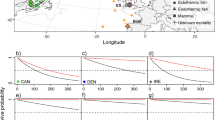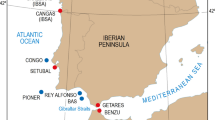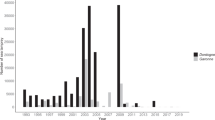Abstract
FOR several years past, migratory fish passing through the Tees estuary have been killed in large numbers. This is most noticeable in the months of April, May, and June, during the seaward migration of young salmon (Salmo solar L.) and sea trout (Salmo truttaL.), when many thousands are found dead oil the foreshore. An extensive biological, chemical, and hydrographical survey of the river, undertaken by the Department of Scientific and Industrial Research as part of the programme of the Water Pollution Research Board, has provided an opportunity for an investigation into the cause of this mortality.
This is a preview of subscription content, access via your institution
Access options
Subscribe to this journal
Receive 51 print issues and online access
$199.00 per year
only $3.90 per issue
Buy this article
- Purchase on Springer Link
- Instant access to full article PDF
Prices may be subject to local taxes which are calculated during checkout
Similar content being viewed by others
References
Lehmann, C., Z. Fischerei, 24, 401; 1926.
Author information
Authors and Affiliations
Rights and permissions
About this article
Cite this article
SOUTHGATE, B., PENTELOW, F. & BASSINDALE, R. Death of Fish in the Tees Estuary. Nature 129, 129–130 (1932). https://doi.org/10.1038/129129a0
Issue Date:
DOI: https://doi.org/10.1038/129129a0
Comments
By submitting a comment you agree to abide by our Terms and Community Guidelines. If you find something abusive or that does not comply with our terms or guidelines please flag it as inappropriate.



